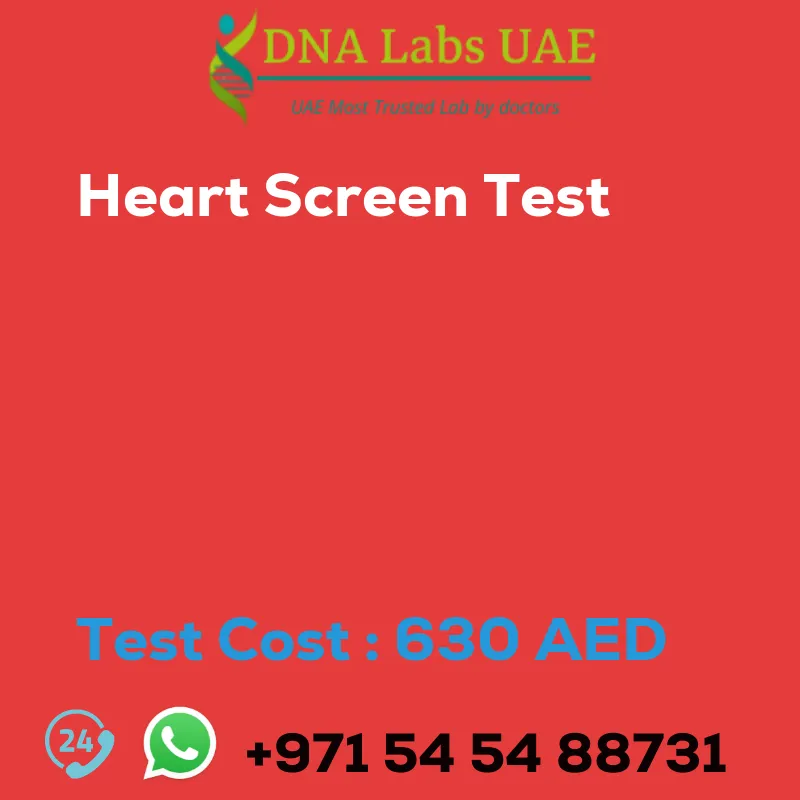HEART SCREEN Test
Cost: AED 630.0
Symptoms, Diagnosis, and Components
The HEART SCREEN test offered by DNA Labs UAE includes the following components:
- hsCRP
- Uric acid
- Glucose Fasting
- Lipid profile basic
- Homocysteine
Sample Condition
3 mL (2 mL min.) serum from 1 SST AND 2 mL (1 mL min.) plasma from 1 Grey Top (Sodium Fluoride) tube. Ship refrigerated or frozen. Minimum 12 hours fasting is mandatory.
Report Delivery
Daily
Method
Immunoturbidimetry, Hexokinase, Spectrophotometry, CMIA
Test Type
Heart diseases, Health check-up
Doctor
Cardiologist, Physician
Test Department
Pre Test Information
Minimum 12 hours fasting is mandatory.
Test Details
A heart screen test, also known as a cardiac screening or heart health check, is a medical examination used to assess the overall health and function of the heart. It is typically recommended for individuals who have risk factors for heart disease or those who want to monitor their heart health.
During a heart screen test, various tests and assessments are conducted to evaluate the heart’s structure, function, and overall cardiovascular health. These may include:
- Medical history review: The healthcare provider will ask questions about your personal and family medical history, lifestyle habits, and any symptoms you may be experiencing.
- Physical examination: The healthcare provider will perform a physical examination, including checking your blood pressure, listening to your heart sounds, and assessing your overall health.
- Blood tests: Blood samples may be taken to measure cholesterol levels, blood sugar levels, and other markers of heart health.
- Electrocardiogram (ECG or EKG): This non-invasive test records the electrical activity of the heart and can help detect abnormal heart rhythms or signs of previous heart attacks.
- Stress test: This test measures the heart’s response to physical activity or stress. It can involve walking on a treadmill or using medication to simulate the effects of exercise on the heart.
- Echocardiogram: This ultrasound test uses sound waves to create images of the heart’s structure and function. It can provide information about the heart’s size, shape, and how well it is pumping blood.
- Cardiac CT scan: This imaging test uses X-rays and computer technology to create detailed images of the heart and its blood vessels. It can help detect blockages or narrowing of the arteries.
- Cardiac MRI: This test uses magnetic fields and radio waves to create detailed images of the heart. It can provide information about the heart’s structure, function, and blood flow.
The results of the heart screen test can help identify any underlying heart conditions or risk factors for heart disease. Based on the findings, the healthcare provider can recommend appropriate lifestyle changes, medications, or further diagnostic tests if necessary. Regular heart screen tests can help detect heart problems early and prevent complications.
| Test Name | HEART SCREEN Test |
|---|---|
| Components | *hsCRP*Uric acid *Glucose Fasting*Lipid profile basic*Homocysteine |
| Price | 630.0 AED |
| Sample Condition | 3 mL (2 mL min.) serum from 1 SST AND 2 mL (1 mL min.) plasma from 1 Grey Top (Sodium Fluoride) tube. Ship refrigerated or frozen. Minimum 12 hours fasting is mandatory. |
| Report Delivery | Daily |
| Method | Immunoturbidimetry, Hexokinase, Spectrophotometry, CMIA |
| Test type | Heart diseases, Health check up |
| Doctor | Cardiologist, Physician |
| Test Department: | |
| Pre Test Information | Minimum 12 hours fasting is mandatory. |
| Test Details |
A heart screen test, also known as a cardiac screening or heart health check, is a medical examination used to assess the overall health and function of the heart. It is typically recommended for individuals who have risk factors for heart disease or those who want to monitor their heart health. During a heart screen test, various tests and assessments are conducted to evaluate the heart’s structure, function, and overall cardiovascular health. These may include: 1. Medical history review: The healthcare provider will ask questions about your personal and family medical history, lifestyle habits, and any symptoms you may be experiencing. 2. Physical examination: The healthcare provider will perform a physical examination, including checking your blood pressure, listening to your heart sounds, and assessing your overall health. 3. Blood tests: Blood samples may be taken to measure cholesterol levels, blood sugar levels, and other markers of heart health. 4. Electrocardiogram (ECG or EKG): This non-invasive test records the electrical activity of the heart and can help detect abnormal heart rhythms or signs of previous heart attacks. 5. Stress test: This test measures the heart’s response to physical activity or stress. It can involve walking on a treadmill or using medication to simulate the effects of exercise on the heart. 6. Echocardiogram: This ultrasound test uses sound waves to create images of the heart’s structure and function. It can provide information about the heart’s size, shape, and how well it is pumping blood. 7. Cardiac CT scan: This imaging test uses X-rays and computer technology to create detailed images of the heart and its blood vessels. It can help detect blockages or narrowing of the arteries. 8. Cardiac MRI: This test uses magnetic fields and radio waves to create detailed images of the heart. It can provide information about the heart’s structure, function, and blood flow. The results of the heart screen test can help identify any underlying heart conditions or risk factors for heart disease. Based on the findings, the healthcare provider can recommend appropriate lifestyle changes, medications, or further diagnostic tests if necessary. Regular heart screen tests can help detect heart problems early and prevent complications. |







